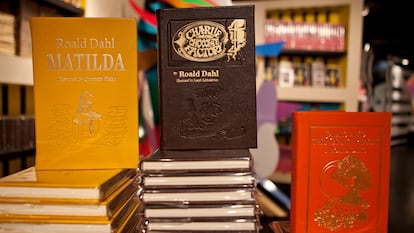Penguin to publish ‘classic’ Roald Dahl books after backlash
Along with the new editions, the company said 17 of Dahl’s books would be published in their original form later this year

Publisher Penguin Random House announced Friday it will publish “classic” unexpurgated versions of Roald Dahl’s children’s novels after it received criticism for cuts and rewrites that were intended to make the books suitable for modern readers.
Along with the new editions, the company said 17 of Dahl’s books would be published in their original form later this year as “The Roald Dahl Classic Collection” so “readers will be free to choose which version of Dahl’s stories they prefer.”
The move comes after criticism of changes made to “Charlie and the Chocolate Factory” and other much-loved classics for recent editions published under the company’s Puffin children’s label, in which passages relating to weight, mental health, gender and race were altered.
Augustus Gloop, Charlie’s gluttonous antagonist in “Charlie and the Chocolate Factory” — originally published in 1964 — became “enormous” rather than “enormously fat.” In “Witches,” a supernatural female posing as an ordinary woman may be a “top scientist or running a business” instead of a “cashier in a supermarket or typing letters for a businessman.”
The Roald Dahl Story Company, which controls the rights to the books, said it had worked with Puffin to review and revise the texts because it wanted to ensure that “Dahl’s wonderful stories and characters continue to be enjoyed by all children today.”
While tweaking old books for modern sensibilities is not a new phenomenon in publishing, the scale of the edits drew strong criticism from free-speech groups such as writers’ organization PEN America, and from authors including Salman Rushdie.
Camilla, the queen consort, appeared to offer her view at a literary reception on Thursday. She urged writers to “remain true to your calling, unimpeded by those who may wish to curb the freedom of your expression or impose limits on your imagination.”
Dahl’s books, with their mischievous children, strange beasts and often beastly adults, have sold more than 300 million copies and continue to be read by children around the world. Their multiple stage and screen adaptations include “Matilda the Musical” and two “Willy Wonka” films based on “Charlie and the Chocolate Factory,” with a third in the works.
But Dahl, who died in 1990, is also a controversial figure because of antisemitic comments made throughout his life. His family apologized in 2020.
In 2021, Dahl’s estate sold the rights to the books to Netflix, which plans to produce a new generation of films based on the stories.
Francesca Dow, managing director of Penguin Random House Children’s, said the publisher had “listened to the debate over the past week which has reaffirmed the extraordinary power of Roald Dahl’s books and the very real questions around how stories from another era can be kept relevant for each new generation.”
“Roald Dahl’s fantastic books are often the first stories young children will read independently, and taking care for the imaginations and fast-developing minds of young readers is both a privilege and a responsibility,” she said.
“We also recognize the importance of keeping Dahl’s classic texts in print,” Dow said. “By making both Puffin and Penguin versions available, we are offering readers the choice to decide how they experience Roald Dahl’s magical, marvelous stories.”
Sign up for our weekly newsletter to get more English-language news coverage from EL PAÍS USA Edition
Tu suscripción se está usando en otro dispositivo
¿Quieres añadir otro usuario a tu suscripción?
Si continúas leyendo en este dispositivo, no se podrá leer en el otro.
FlechaTu suscripción se está usando en otro dispositivo y solo puedes acceder a EL PAÍS desde un dispositivo a la vez.
Si quieres compartir tu cuenta, cambia tu suscripción a la modalidad Premium, así podrás añadir otro usuario. Cada uno accederá con su propia cuenta de email, lo que os permitirá personalizar vuestra experiencia en EL PAÍS.
¿Tienes una suscripción de empresa? Accede aquí para contratar más cuentas.
En el caso de no saber quién está usando tu cuenta, te recomendamos cambiar tu contraseña aquí.
Si decides continuar compartiendo tu cuenta, este mensaje se mostrará en tu dispositivo y en el de la otra persona que está usando tu cuenta de forma indefinida, afectando a tu experiencia de lectura. Puedes consultar aquí los términos y condiciones de la suscripción digital.








































